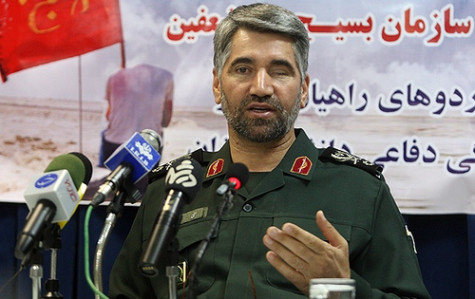A deputy commander of the Islamic Revolutionary Guards Corps has confirmed that the IRGC was authorized to intervene in the disputed 2009 Presidential election, this time by comparing it to the suppression of protests in 1994 and 1999.
Mahmoud Ahmadinejad was declared the winner in the first-round ballot on June 12, despite widespread evidence of manipulation of the vote. Campaign workers, activists, and journalists were detained and harassed before, during, and after the ballot, and the headquarters of opposition candidates were raided.
Three days later, more than a million people marched in Tehran and other cities to protest against the regime’s proclamation of Ahmadinejad’s victory. The regime countered with widespread mobilization of security forces, mass arrests, disruption of communications, and blocking of newspapers and websites — to this day, as it maintains many of these measures, it says the protests were foreign-backed “sedition”.
Brigadier General Ali Fazli spoke Thursday of three interventions: in 1994, when security forces clashed with demonstrators in Qazvin city in northwest Iran; in 1999, following large student protests in Tehran; and in 2009.
Fazli was particularly concerned to say that the IRGC was prepared for the mass demonstrations after the Ahmadinejad “victory”: “The ‘sedition’ did not catch us off-guard.”
He explained that, in 1999, the Supreme National Security Council held a meeting to give the Guards the authority to suppress the protests. However, in June 2009, the “situation was better” — apparently because the IRGC could act without having to refer to a political body for authorization.
Fazli’s statement echoes others by Guards commanders, both in 2009 and recently. A few days before the election, the head of the IRGC’s Political Directorate, Brigadier Yadollah Javani, accused Presidential candidate Mousavi and other reformists — who had adopted Green as their symbol — of trying to start a “color revolution”. He warned that the Guards “will suffocate (the movement) before it is even born”.
A year later, a leaked audio and Power Point documented a presentation by a “General Moshfegh” outlining the IRGC’s strategy before and after the ballot. He described measures that included detentions, disinformation, and other steps to ensure the “right” candidate won.
This past May, the head of the IRGC, Mohammad Ali Jafari, effectively confirmed Javani’s warning and the Moshfegh statement. told officers that his forces had acted because of a “red line” that reformists must not return to power. He said the order was that the vote should not go to an “unpredictable” second round between Ahmadinejad and his main challenger Mousavi.
See Did Revolutionary Guards Commander Admit Interference in 2009 Presidential Election?
Iran Video: The Revolutionary Guards’ Intervention in 2009 Presidential Election — The Sequel

